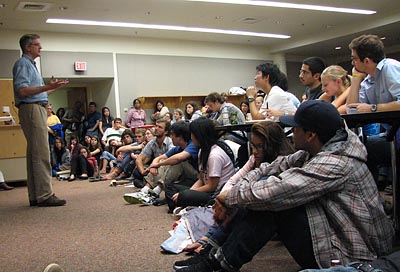Where Credit Is Due
The lessons go beyond economics when an entire department helps students sort out the credit crisis
Story and photograph by H. Jay Burns
Earlier in the fall, Jared Levy ’09 of Ardmore, Pa., tried to fathom the worldwide financial crisis by reading online news stories. But the webscape, “littered with vague and threatening headlines,” only compounded the confusion, he says.
The ongoing financial meltdown left a lot of students, like the public, both anxious and bewildered. They were “alarmed without knowing why they should be alarmed,” in Levy’s words, and confused by events occurring in a sector far removed from their experience. “We didn’t have the language to comprehend what the news was telling us,” says Katie Conkling ’09 of East Chatham, N.Y.

In September, Sowell Professor of Economics James Hughes speaks to the SRO crowd in Pettengill Hall’s Keck Classroom about the ongoing financial crisis.
Hence one of the largest turnouts for an academic talk in recent memory, when a few hundred students headed to Pettengill Hall on Oct. 1 to hear nearly the entire Bates economics department discuss the crisis. In the process, the professors offered students what the media did not: a plainspoken explanation of the crisis, its causes, and whether a $700 billion infusion into the credit markets would work.
It’s rare at any college for nearly an entire academic department to turn out, ad hoc and on a day’s notice, to discuss a single issue (of the full-time economists on campus, only one professor, dealing with a family emergency, did not attend). Some disciplines are more attuned to current events than others, and some are more amenable to team presentations.
Part of what made the Oct. 1 event possible, says Jim Hughes, the Sowell Professor of Economics, is that “we have great respect for one another as individuals and as economists. This gives us great space to bat ideas around without fear of being ‘wrong’ and, especially, without fear of people engaging in one-upmanship.”
The event’s genesis was unusual, too, prompted as it was by non-econ majors: philosophy majors Anne Sheldon ’09 of Brookline, Mass., and Danny Bousquet ’09 of Savannah, Ga., along with the aforementioned Levy (philosophy) and Conkling (double major in French and women and gender studies). They’d been talking about the crisis one night in the library, noting how it was playing out with a lot of “finger-pointing and assigning blame,” says Levy. So they e-mailed economics chair Lynne Lewis (profiled on page 24) asking if the department might help explain the crisis.
| “At crucial times like these, students and the public need to see us not in the role of the distributors of truth — if ever they should,” says Hughes. |
Lewis and her economics colleagues, after a hallway huddle on Pettengill’s second floor, readily agreed to speak the following day. “As educators, we should respond during major events,” says Lewis. The subject line of her campuswide e-mail captured the event’s on-the-fly nature: “WTF??!! Bates Economists on the Economy!!”
After filling the Keck Classroom’s 125 seats, attendees pulled more chairs from nearby rooms. Others lined the walls, while a few lay on the floor. “It was outrageous how many people attended,” said Conkling.
Moderating the event, Lewis got one of several nervous laughs by noting that “of course” the “WTF” in the talk’s title stands for “What’s The Future?”
The 90-minute presentation was essentially academic skinny-dipping, as the professors talked in unadorned language about issues they, too, were trying to learn about. They deferred to each other at times, and offered corrections at other moments. “At crucial times like these, students and the public need to see us not in the role of the distributors of truth — if ever they should,” says Hughes, but “as informed citizens who are, like them, trying to process this flood of information to decide what they believe.” (For the record, the Bates economists supported the concept of the $700 billion rescue plan while noting that opinions might differ on its mechanics.)
For the students, the event succeeded, says Molly Nelson ’11 of Albuquerque, N.M., if only because she now understands “what [the government] is trying to save.”
Levy, meanwhile, is “proud that so many people took a stake in their political and economic lives,” while fellow event instigator Sheldon gives props to the professors for their “amazing job clarifying a complex issue” — adding thanks that “confused humanities majors” were taken seriously.
“As Bates students, we are taught to be conscious citizens. We also realize that to create change we need to understand what is happening,” adds Conkling. “The panel was a wonderful depiction of what Bates is all about.”
And how’d the professors grade their performance? “We had fun,” says Hughes. “It was a great teaching moment. Seeing how someone trained in a discipline approaches a new problem can give great insight into how a discipline works.”
Ironically, the sense of engagement that prompted the Bates panel is quite the opposite of what precipitated the crisis, according to the Bates economists: the failure of many people to take responsibility for what they were doing. The list includes the homeowners who didn’t try to understand their mortgages, the lenders who knew they were making bad loans, and the financial wizards who bundled the risky mortgages into securities so arcane that no one knows what they’re worth today.
“What brought on this mindset?” George Perkins, a former banker and visiting associate professor, asked during the panel discussion. “That’s where I would point the blame.”